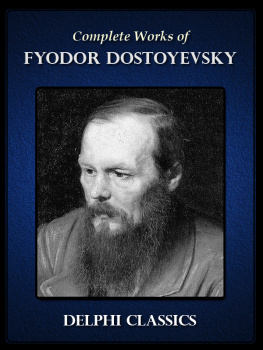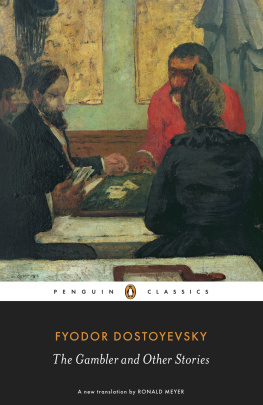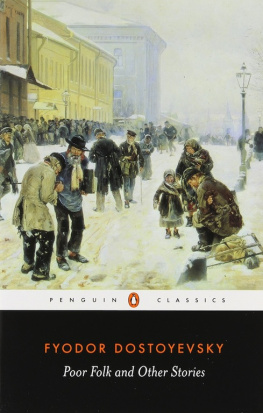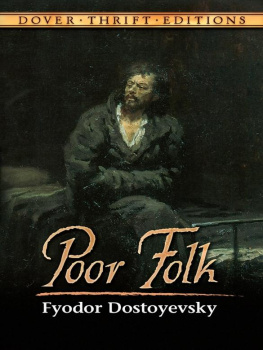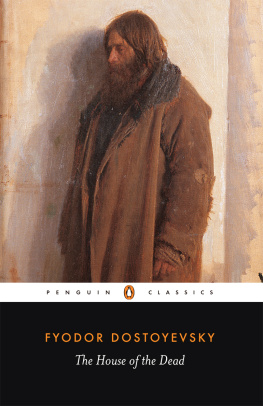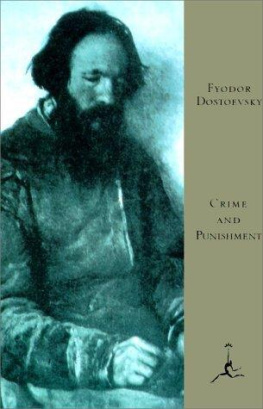Fyodor Dostoyevsky - Netochka Nezvanova
Here you can read online Fyodor Dostoyevsky - Netochka Nezvanova full text of the book (entire story) in english for free. Download pdf and epub, get meaning, cover and reviews about this ebook. year: 1985, publisher: Penguin Books Ltd, genre: Art. Description of the work, (preface) as well as reviews are available. Best literature library LitArk.com created for fans of good reading and offers a wide selection of genres:
Romance novel
Science fiction
Adventure
Detective
Science
History
Home and family
Prose
Art
Politics
Computer
Non-fiction
Religion
Business
Children
Humor
Choose a favorite category and find really read worthwhile books. Enjoy immersion in the world of imagination, feel the emotions of the characters or learn something new for yourself, make an fascinating discovery.

- Book:Netochka Nezvanova
- Author:
- Publisher:Penguin Books Ltd
- Genre:
- Year:1985
- Rating:4 / 5
- Favourites:Add to favourites
- Your mark:
- 80
- 1
- 2
- 3
- 4
- 5
Netochka Nezvanova: summary, description and annotation
We offer to read an annotation, description, summary or preface (depends on what the author of the book "Netochka Nezvanova" wrote himself). If you haven't found the necessary information about the book — write in the comments, we will try to find it.
Netochka Nezvanova — read online for free the complete book (whole text) full work
Below is the text of the book, divided by pages. System saving the place of the last page read, allows you to conveniently read the book "Netochka Nezvanova" online for free, without having to search again every time where you left off. Put a bookmark, and you can go to the page where you finished reading at any time.
Font size:
Interval:
Bookmark:
NETOCHKA NEZVANOVA
FYODOR MIKHAILOVICH DOSTOYEVSKY was born in Moscow in 1821, the second of a physicians seven children. When he left his private boarding school in Moscow he studied from 1838 to 1843 at the Military Engineering College in St Petersburg, graduating with officers rank. His first story to be published, Poor Folk (1846), was a great success. In 1849 he was arrested and sentenced to death for participating in the Petrashevsky circle; he was reprieved at the last moment but sentenced to penal servitude, and until 1854 he lived in a convict prison at Omsk, Siberia. Out of this experience he wrote The House of the Dead (1860). In 1861 he began the review Vremya (Time) with his brother; in 1862 and 1863 he went abroad, where he strengthened his anti-European outlook, met Mlle Suslova, who was the model for many of his heroines, and gave way to his passion for gambling. In the following years he fell deeply in debt, but in 1867 he married Anna Grigoryevna Snitkina (his second wife), who helped to rescue him from his financial morass. They lived abroad for four years, then in 1873 he was invited to edit Grazhdanin (The Citizen), to which he contributed his Diary of a Writer. From 1876 the latter was issued separately and had a large circulation. In 1880 he delivered his famous address at the unveiling of Pushkins memorial in Moscow; he died six months later in 1881. Most of his important works were written after 1864: Notes from Underground (1864), Crime and Punishment (18656), The Gambler (1866), The Idiot (1869), The Devils (1871) and The Brothers Karamazov (1880).
JANE KENTISH was born in 1953 and took a B.A. in Russian Literature in 1974 at the University of Sussex, where two years later she gained her M.A. in Byzantine and Russian Art and Architecture. Since then she has worked as a researcher. She gives occasional lectures in Byzantine History and Art and has published various articles on Far and Middle Eastern art. Her translation of Tolstoys A Confession and Other Religious Writings is also published in the Penguin Classics.
FYODOR DOSTOYEVSKY

TRANSLATED WITH AN INTRODUCTION BY JANE KENTISH
PENGUIN BOOKS
PENGUIN BOOKS
Published by the Penguin Group
Penguin Books Ltd, 27 Wrights Lane, London W8 5TZ , England
Penguin Putnam Inc., 375 Hudson Street, New York, New York 10014, USA
Penguin Books Australia Ltd, Ringwood, Victoria, Australia
Penguin Books Canada Ltd, 10 Alcorn Avenue, Toronto, Ontario, Canada M4V 3B2
Penguin Books (NZ) Ltd, Private Bag 102902, NSMC, Auckland, New Zealand
Penguin Books Ltd, Registered Offices: Harmondsworth, Middlesex, England
This translation first published 1985
19
Copyright Jane Kentish, 1985
All rights reserved
Except in the United States of America, this book is sold subject to the condition that it shall not, by way of trade or otherwise, be lent, re-sold, hired out, or otherwise circulated without the publishers prior consent in any form of binding or cover other than that in which it is published and without a similar condition including this condition being imposed on the subsequent purchaser
ISBN:978-0-14-193629-1
Contents
Netochka Nezvanova, which can be loosely translated as nameless nobody, was Dostoyevskys first attempt at writing a novel. The idea is first aired in the year 1846 in a letter written to his brother where he says that he intends to write a big novel in the form of a confession. It seems that he hoped to finish the work by the end of the following year, but the design of the novel was so ambitious and conceived on such a grandiose scale that the young writer was unable to meet all its demands; it was not until the end of 1849 that the first completed section of the book was published. This fragment, the story of a young girls childhood, was intended as no more than a prologue to the novel. Dostoyevskys work on it was terminated shortly after the first serialized publication; he was arrested for alleged revolutionary activities as a member of the Petrashevsky group (Utopian Socialists) and subsequently imprisoned and exiled to Siberia, after being spared the firing squad at the last moment.
Neither during his period of exile nor on his return from Siberia in 1859 did Dostoyevsky resume work on Netochka Nezvanova. All we have is the first, unfinished section which is, however, intriguing as a record of the great authors earliest attempt to embody his thoughts and ideas in the novel form. Although Netochka Nezvanova lacks some of the artistic coherence of his later, more mature works, it nevertheless presents an exhaustive display of those themes which characterize Dostoyevskys major works: grotesque pictures of both the seedy and the more noble side of Petersburg life and society; chronically sick and suffering people whose delirium and fantasy lead to a state of heightened consciousness bordering on madness; incestuous relationships; the impoverished artist struggling in a garret; murder and martyrdom; guilt and atonement for sin; the meek woman and the proud woman; will-power and mental inertia. All these ideas, present here in embryonic form, were explored, developed and reworked by Dostoyevsky for the rest of his literary career.
The translation of Netochka Nezvanova has presented certain difficulties, mainly owing to a lack of stylistic unity in the original text. The story is in autobiographical form, related by Netochka, as she recalls her childhood. Dostoyevsky makes a deliberate attempt to record and interpret events initially in the manner of a child and later in the manner of a young adult, which leads to a sharp change in the style and tone of the narration, so that it falls into three distinct and rather detached sections. This has been a source of some difficulty, since it is impossible to adopt one consistent style of translation. A further problem has been the search for an idiom appropriate to the period, for my aim has been to follow the original text as closely as possible in all respects.
Despite these difficulties it has been a most rewarding task to translate this book, particularly since it uncovers the authors earliest struggles with the form of the novel, the emergence of a style that is so typically his own and, above all, his youthful experiments with philosophical and psychological ideas and themes that become even more compelling in his later works.
1984
J.K.
I cannot remember my father. He died when I was two years old. My mother remarried, but it was a marriage that brought her great suffering, although she had married for love. My stepfather was a musician and was destined to lead a most remarkable life. He was the strangest and most extraordinary person I have ever known. He had too powerful an influence over my early childhood, and this certainly affected my whole life. In order to make my story more comprehensible I must first give an account of his life, the details of which I only learnt later from the famous musician B. who was a companion and close friend of my stepfathers in his youth.
My stepfathers name was Efimov. He was born in a village on the estate of a very rich landowner. He was the son of a poor musician who after many years of wandering had settled on this landowners estate and was hired to play in his orchestra. The landowner surrounded his life with luxury and above all was passionately devoted to music. It was said of him that he had never once left his estate, not even to go to Moscow, but one day he suddenly decided to take the waters at some spa abroad and ended up by staying there for several weeks with the express purpose of listening to a famous violinist who, as he gathered from the newspapers, was giving three concerts there at the spa. He himself owned a fairly respectable orchestra on which he spent almost his entire income. It was with this orchestra that my stepfather played the clarinet.
Next pageFont size:
Interval:
Bookmark:
Similar books «Netochka Nezvanova»
Look at similar books to Netochka Nezvanova. We have selected literature similar in name and meaning in the hope of providing readers with more options to find new, interesting, not yet read works.
Discussion, reviews of the book Netochka Nezvanova and just readers' own opinions. Leave your comments, write what you think about the work, its meaning or the main characters. Specify what exactly you liked and what you didn't like, and why you think so.

